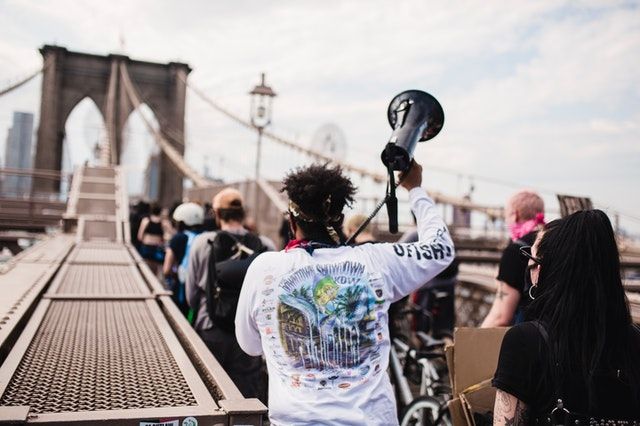From I Have a Dream - A Brief Talk on the Ups and Downs of Aboriginal Culture
I have a dream

I'm sure everyone is familiar with this classic saying!
This came from a black American pastor who was also a well-known leader of the civil rights movement.
Yes, his name is: Martin. Ruth. King
He is committed to advancing the issue of human rights equality, including "the peaceful and equal coexistence of blacks and whites ".
Racial discrimination was very serious in American society at that time...
Through the efforts of Pastor Kim and other people with lofty ideals...
Eventually the Civil Rights Act and Voting Rights Act were passed in 1964 and 1965.
These rights that should be born as human beings are returned to the black community.
With the development and diversity of society so far, although there is no human rights at all as in the 19th century...
But there is still a certain amount of discrimination.
Today's black racial issues are not the same as in the past, but it is a new challenge to the modern black race.
How to face it is also an issue for the emerging generation to face.
From I Have a Dream - A Brief Talk on the Ups and Downs of Aboriginal Culture
I talked about the history of blood and tears in the human rights movement of the black ethnic group...
From this, we can see the difficulties encountered in the early stage of the promotion of the issue; until the due rights are obtained.
This process is not easy from start to finish, and may also involve bloodshed.
Without reminding You Tsai of the bitterness of the past aboriginal cultural heritage...
Forbidden Era - Hidden Artifacts
In the myths of the aborigines in Taiwan, there is more or less "big water", and because of this big water, they entered an island. That island is today's Taiwan, and it has been on that island since then. Starting to live so far...
From the Dutch (Netherlands) West (Spain) era to the Qing Dynasty, the leaders of that period and the aborigines had almost no exchanges except for the exchange of resources on the mountain through exchanges. conflict. (At that time, the aboriginal people still had the culture of Kushou --> I will share it with you in a special topic next time)
Until the time of Japanese occupation, the government at that time prohibited many cultural things of the aborigines, including face masks, kushou , harpsichord, etc., because they knew that to disintegrate a tribe, they needed to start with cultural habits, because That is the core. If there is no culture, how do you talk about inheritance? How do you prove who you are?
However, thanks to the risky efforts of our ancestors, we were able to preserve some cultural products, so that everyone can know the aboriginal people!
Forbidden Era - Language & Name Hiding
Even in the era of the Republic of China, in order to manage the aborigines more conveniently, in the collection of household registration data, surnames were randomly assigned to ethnic people who did not have Chinese names, and under the policy of implementing the national language, it was forbidden to speak dialects, which led to Later, the indigenous students did not speak dialects, which led to slow cultural inheritance.
stigmatizing title
The aborigines were the earliest inhabitants of Taiwan, but they were ruled by foreign regimes in turn and were given different names, from "Fan" in the Qing Dynasty to "Takasago" in the Japanese occupation period to "Mountain compatriots" in the Republic of China period. They all have strong discriminatory connotations, are symbols of stigma, and are titles decided by the rulers themselves. Indigenous peoples do not have the right to decide their own names...
But everything slowly turned around in 1980.
From I have a dream ~ a dream come true

Although the environmental background at that time was still in the period of martial law, with the process of democratization and the concept of national self-determination of the international indigenous movement, the issue of indigenous people gradually emerged, and many indigenous intellectuals joined the ranks of social movements. .
Because of this social movement, it has blossomed everywhere. Although it took some time, the "indigenous peoples" with the attributes of collective rights were finally incorporated into the constitution in 1997. This was a major turning point and a day worth remembering.
Therefore, the road to promoting aboriginal culture is no longer a bumpy one. Although there are still some conflicts or problems caused by incomprehension, Youzai firmly believes that as long as you keep correcting and understanding positively, there must be a solution.
Epilogue
Whether it is Martin. Ruth. The black movement advocated by Jin En's I have a dream, or the national movement of Taiwan's aborigines, all have one thing in common, " We are actually all trying to be seen ", in order to pursue equality, just like Dr. Jin En and Thomas Jefferson once said: "All men are created equal ", there should be no distinction, no discrimination, and no hatred.
Youzai is convinced that the day is not far away, but it still takes time to work hard. I hope that everyone can have the will to understand.
Like my work? Don't forget to support and clap, let me know that you are with me on the road of creation. Keep this enthusiasm together!



- Author
- More